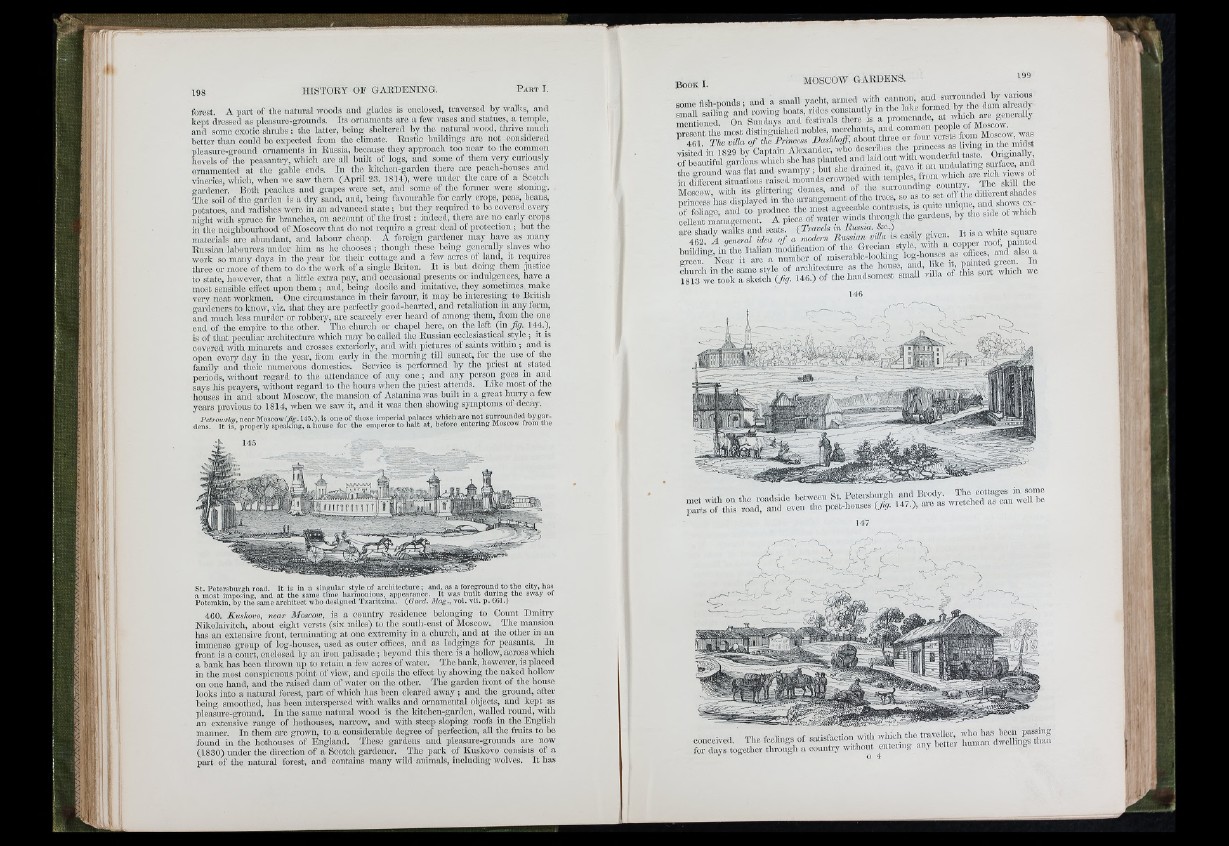
IIISTOUY OF GAUUENING. P art I.
forest. A part of the natural woods and glades is enclosed, traversed by walks, and
kept dressed as pleasure-grounds. Its ornaments arc a few vases and statues, a temple,
and some exotic slirubs ; tbe latter, being sheltered by the natural wood, thrive ninch
better tban could be expected from the climate. Rustic bnildings arc not considered
pleasure-ground ornaments in Russia, because they approach too near to the common
hovels of the peasantry, which arc all built of logs, and some of them very curiously
ornamented at the gable ends. In the kitchcn-gardcn there arc pcacli-honscs ami
vineries, which, when wo saw them (April 23. 1814), were nndcr tho care of a Scotch
gardener. Both peaches and grapes were set, ami some of the former wore stoning.
Tlio soil o fth e garden is a dry sand, and, hciiig favourable for early crops, peas, beans,
potatoes, and radishes were in an advanced state ; bnt they required to bo covered every
niglit with spruce fir branches, on account of the fro s t; indeed, there are no early crops
in”tho neighbourhood of Moscow that do not require a great deal of protection ; but tho
materials arc abundant, and labour cheap. A foreign gardener may have as many
Russian laliotirevs under liiiii as ho chooses; though these being generally slaves lyho
work so many days in the year for their cottage and a fcw^ acres of land, it requires
three or more of tlicm to do the work of a single Briton, It is but doing tlicm justice
to state, bowovor, tliat a little extra pay, and oceasional presents or indulgences, have a
most sensible eficct upon them ; and, being docile and imitative, they sometimes make
very neat Avovkmcn. One circumstance in tlicir favour, it may be interesting to British
gardeners to knoAV, viz. that they arc perfectly good-hearted, and retaliation m any form,
and much less murder or rohbcry, arc scarcely ever heard of among them, ironi the one
end of the empire to tho other. The clinrch or chapel here, on tho left (in f g . 144.),
is of that peculiar arehitecturc Avhieh may he called the Russian ccclcftastieffi fty lc ; it is
covered Avith minarets and crosses exteriorly, and Avitli pictures of saints Avithin; and is
open every day in the year, irom early in the morning till sunset, for the use of the
family and their nninerous domestics. Service is performed by the priest at stated
periods, Avithout regard to the attendance of any o n e ; and any person goes m mid
says his prayers, AA'ithout regard to the hours AA-hcn the priest attends. I.iko most oi the
houses in and about M oscoav, the miuision of A stanina Avas built in a great h iu iy a Icav
yeai-s previous to 1814, when wo saw it, and it was then showing symptoms of decay.
Pcireiijsiil.nca rMoscow iiis.MS.i.is ono of thoso impoi-iiil pnlacos which are not suvroiiniiml by gardens.
It is, properly speaking, a house for th e emperor to h alt at, before entering Moscow from tho
St. Petersburgh road. It is in a singular style of architecture ; and, as a foreground to the city, has
a most imposing, and a t th e same time harmonious, appearance. It was Iiuilt during th e sway ol
Potemkin, by the same architect who designed Tzaritzina. (Girl'd. Mag., vol. vll. p. 6fi].)
460. Kuskovo, near Moscow, is a country residence belonging to Count Dmitry
Nikolaivitcli, about eight versts (six miles) to tlie soutli-cast of Moscow. The mansion
has an extensive front, tcrniniatiiig at ono extremity in a churcli, and at tho other in an
immense group of log-liou.scs, used as outer ofliccs, and as lodgings for peasants. Iu
front is a conrt, enclosed by an iron palisade ; beyond this tlicrc is a hollow, across which
a bank has heen thrown up to retain a few acres of water. Tho bank, however, is placed
in the most conspicuous point of view, and spoils the eficct by showing the naked hollow
on one hand, and tlio raised dam of ivatcr on tho other. Tlic garden front of tho house
looks into a natural forest, part of wliich has been cleared away ; and the ground, after
beino- smoothed, has been interspersed with walks and ornamental objects, and kept as
pleasure-ground. In tho same iintnral wood is the kitchen-garden, walled round, with
an extensive range of liothouses, narrow, and with steep sloping roofs in tlic English
manner. In them arc grown, to a considoralilo degree of perfection, all the ftnits to ho
found in the liothouses of England. These gardens and pleasure-grounds are now
(1830) under the direction of a Scotch gai-dencr. The park of Kuskovo consists of a
pai't of the natural forest, and contains many wild animals, including wolves. It has
MOSCOW GARDENS.
B o o k 1.
147
, - - A 1- ^ ' '■'•..--•-A
hi;m ]:Yi.?Sun?s